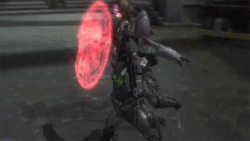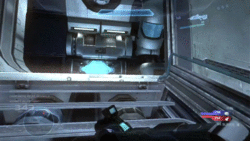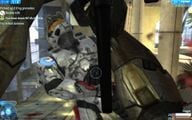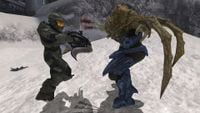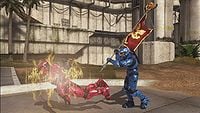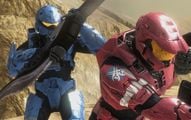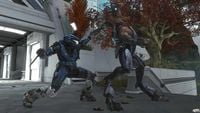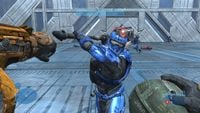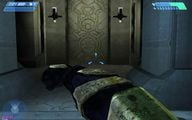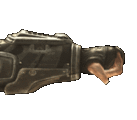Melee
From Halopedia, the Halo wiki
| This article does not have enough inline citations and/or does not adhere to the proper citation format. You can help Halopedia by adding citations. |
A melee is the act of physically attacking an enemy by hitting them with a weapon. In the Halo series, the majority of melee attacks involve using a ranged weapon as a bludgeon, while there are a few weapons that are melee-only. The melee action can be executed by pressing the B button on the default controller layout for the Xbox/Xbox 360 version of Halo: Combat Evolved, Halo 2, Halo 3, Halo 3: ODST, and Halo 2: Anniversary by pressing the F key on the PC version of Halo: Combat Evolved and Halo 2, by pressing the RB button on Halo: Reach, Halo: Combat Evolved Anniversary, Halo 4, and Halo 5: Guardians with the default control setting, and by pressing the space bar in Halo: Spartan Assault and Halo: Spartan Strike with the default control setting.
Overview
Melee attacks are stealthy and conserve ammunition. The close-range attack causes damage to the target's bones and tissues, allowing an attacker to injure a target without using ammunition. A melee from behind functions by breaking the target's neck or spine, and is sufficient to kill virtually any enemy in the games, regardless of how much shielding or armor they happen to be wearing (with the exception of Hunters and Flood forms). Also, one melee against a sleeping Unggoy, regardless of difficulty or their rank, will kill them instantly.
In Halo: Reach, a new melee feature, called an assassination, is presented. They must hold the melee input while being behind the enemy, initially stabbing the opponent from behind to break their opponents' necks.
In Campaign, melees are classified as "silent".
Melee attacks are commonly used in multiplayer matches, where only a few blows are needed to kill an opponent; they allow one player to kill another without the sound of gunfire revealing their location or the weapons they are carrying. Melees are more efficient when used from behind.
Occasionally, two players with depleted or near-depleted shields will hit each other at around the same time, resulting in both players dying.
Lunging
When wielding a melee weapon, it is possible to lunge at a distant enemy. If a target is close enough that aiming at them turns an attacker's reticle red, then the attacker can aim at them and press RT. This will cause the attacker to lunge forward before striking.
A lunge delays a melee. If an attacker is wielding the Gravity Hammer and approaching an enemy, and if the attacker aims away from the target, they can swing the hammer the moment their target gets within the "blast radius", killing the victim almost instantly. If, however, the attacker aims at the target, then the attacker will lunge before striking, even if the target is already within range when RT is pressed. The lunge delays the swing, giving the target more time to react, and creating extra risk for the attacker.
By contrast, lunging is extremely helpful when using the Energy Sword, as it lacks splash damage.
The lunging function is present in all games for all weapons following Halo: Combat Evolved. The range of the lunge for standard weapons, however, is much smaller than that of melee weapons. Additionally, the energy sword possesses a far greater lunge distance than that of the gravity hammer in Halo 3, Halo: Reach, and Halo 4.
Melee System
Halo: Combat Evolved and Halo: Combat Evolved Anniversary
Melee is introduced in Halo: Combat Evolved. There is no lunge function, however, and melees are only powerful enough to deplete roughly two thirds of an enemy's shields (in multiplayer). Consequently, melees are a viable combat option only when dispatching unshielded opponents or attacking from behind.
In campaign, melees cause almost no damage to non-Pod infector Flood. By contrast, they are easily used to finish stray Pod infectors while conserving ammunition.
In multiplayer, there are 3 levels of melee momentum that dish out different amounts of damage.
- A standing melee will take down an opponent's shield 75%.
- A running melee will completely take out an opponent's shield.
- A jumping melee will completely take out an opponent's shield + 1 bar of health.
A double running melee will take out an opponent, but both melees must be moving.
In addition, there are 4 tiers of weapon melee range, 1 having the longest reach and 4 having the shortest reach.
- Rockets
- Assault Rifle, Sniper
- Plasma Pistol, Plasma Rifle, Shotgun, Needler
- Magnum
If 2 players kill each other with a melee at the exact same time, one of the deaths will be attributed to The Guardians, since the game doesn’t allow a player waiting to respawn to have ownership of a melee.
Halo 2 and Halo 2 Anniversary
Halo 2's melee system was based on three levels of player movement as well as the weapon held. A stationary melee does the least damage (with some weapons taking six melees to kill a fully shielded spartan), a running melee taking down roughly half of the target's shields (giving some weapons a three hit kill, and a jumping melee almost completely removing the target's shields (giving some weapons a two hit kill). With a patch, this system was updated massively to buff most weapons[1].
With the introduction of dual wielding, a new feature was added: if a player performs a melee attack while dual-wielding, they will drop their left weapon.
In Halo 2, melee attacks had the added benefit of canceling various animations and delays. This trait was shared by various other actions, and was exploited in the form of special button combinations.
Meleeing flood combat forms in Halo 2 does not deal any damage and this has been used in certain levels as a way to skip large portions of the level by "flying" during a speed run.
Melee attacks now have a lunge to assist in dealing blows.
The range of the melee attack was decreased in Halo 2 from Halo: Combat Evolved.[citation needed]
Halo 3
In Halo 3, the attack's power increased, such that two blows to a normally-shielded opponent's body were sufficient to kill them. The attack also became more effective against some Campaign enemies, with fewer hits required to kill a Flood combat form. A Halo 3 title update balanced melees; if two unshielded players melee each other, both will die, and both will receive a point.
The increased power of Halo 3's melee attack has led to various new tactics and techniques regarding its usage. A common tactic is to charge an opponent using an Assault Rifle; the attacker drains their opponent's shields with the rifle, and then uses a melee to finish them off. Melees are also used in Noob Combos, with a common combo being the usage of a Type-52 Mauler to drain an opponent's shields, followed by a melee.
A new feature is the ability to perform a normal melee attack while using melee weapons. Such weapons have both an RT attack and a B attack; the former attack is powerful, whereas the latter is faster. The Energy Sword's B attack is a rapid swipe; when pressing B with the Gravity Hammer, a player's character will jab the butt of the hammer forward. It should be noted that this attack causes much less damage than the gravity shockwave, but costs no energy.
Assassinating an opponent in multiplayer earns the player an Assassin medal, while a normal melee kill yields a Beat Down medal.
Halo 3: ODST
In Halo 3: ODST, the power of the melee attack has been drastically reduced, because the player characters, ODSTs, are ordinary humans, much weaker than the playable SPARTAN-IIs and Elites from previous titles. Although attacking from the rear is still lethal, it can take several hits from other angles to take down even the lowly Jackal, and trying to take on a Brute in hand-to-hand combat is risky, though 3-4 hits on normal difficulty is still lethal. However, it's still possible to board a tank and destroy it with a few melees, possibly for gameplay reasons, or it may simply have been an oversight on Bungie's part. If you use the Brute Spikers/Brute Shot's "knife" melee however, you would get the same result as a Spartan's melee because of the blades underneath.
Halo: Reach
In Halo: Reach, the melee is weaker than in previous games. Additionally, a new melee feature called "Assassination" is added to the game where players will be pulled into third-person view and watch an animation of their player model executing the enemy, with many of the Assassinations featuring UNSC combat knives (or Sangheili energy daggers if the player is an Elite). The feature is accessible to players by holding down the melee button while behind the enemy. There are more than 40 different animations that change depending on the position, weapon, gametype, and Armor Ability used.[1] Melee attacks are also able to "clang", where if two melee hits connect, instead of both players receiving damage they bounce off of each other instead. This can be used to counter the Energy Sword's "Lunge" attack, which, in previous games, was an instant kill.[2] In addition, if an enemy is in the act of being assassinated my a member of your team, you can in turn steal their kill by quickly killing the individual being assassinated. If you can manage to do so, such an act rewards you with the "Yoink!" medal, and an immediate voice announcing so. It also important to note that when being assassinated an ally can kill the opponent attempting to kill you giving them the medal Showstopper!.
Halo 4
Melee returns in Halo 4. Assassinations also return, but with entirely new animations.[2]
 This section needs expansion. You can help Halopedia by expanding it.
This section needs expansion. You can help Halopedia by expanding it.
Halo: Spartan Assault and Halo: Spartan Strike
 This section needs expansion. You can help Halopedia by expanding it.
This section needs expansion. You can help Halopedia by expanding it.
Halo 5: Guardians
The classic melee and assassination mechanics are featured in the game, however the new Spartan abilities provide players with additional options. If a player is sprinting and presses the melee button, they will perform a Spartan charge. If a player jumps and holds the melee button in the air they will perform a ground pound. Melee deals the same damage as in Halo 3, allowing for 2 attacks to kill a target. Melee attacks cannot cancel energy sword swings, and energy swords will clash, dealing reduced damage to both attackers. If gravity hammers clash, both will die. Gravity hammers will cancel energy sword hits. Each weapon has multiple melee animations.
 This section needs expansion. You can help Halopedia by expanding it.
This section needs expansion. You can help Halopedia by expanding it.
Halo Online
 This section needs expansion. You can help Halopedia by expanding it.
This section needs expansion. You can help Halopedia by expanding it.
Halo Infinite
 This section needs expansion. You can help Halopedia by expanding it.
This section needs expansion. You can help Halopedia by expanding it.
Trivia
- In Halo: Combat Evolved, a melee attack in the back can kill a Marine instantly. This was changed in Halo 2 and Halo 3.
- If a player gets too close, Hunters will use their shields as melee weapons. A common tactic in Halo: Combat Evolved was to get close to a Hunter, then duck behind them while they swing to get an unobstructed shot at the weak point on their back. In Halo 2, Hunters were given rearward attacks specifically to counter this tactic.
- In Halo 2's campaign, one melee from an Elite on Normal difficulty can instantly kill the player, Rarely, the player doesn't die; the player should not have taken any damage, and the melee was delivered in the front.
- In the pre-beta (Bungie employees and staff only) versions of Halo 3 Multiplayer, the melee was less powerful, with a single melee failing to significantly deplete a player's shields.[citation needed]
- In the Halo 3 Campaign, the Arbiter can melee while dual-wielding Plasma Rifles without dropping them. Similarly, Brute Chieftains who carry Pek-pattern plasma cannons can still melee the player with it, most likely due to their colossal strength. The player, who takes control of a Spartan-II, the Arbiter, or Elites in Campaign and multiplayer have the strength needed to perform such feats, however allowing this would affect game balance.
- In Halo 3, beserking Brutes will often appear to attempt to bite opponents, though damage inflicted remains the same.
- In Halo 3, it is possible to assassinate a player through thin glass, such as that found in the bases on Valhalla and Snowbound. Also, a melee on the right shoulder will grant an Assassination Medal, the left shoulder will not.[citation needed]
- In Halo Wars, the Spartans will often "drop" their weapon to start meleeing a close enemy.
- If the player melees during the right time in Halo: Reach when an enemy lunges with the energy sword, the player can survive. However, the damage performed leaves behind very little health and the next lunge will kill.
- In Halo: Reach, the Type-1 energy sword does not consume its energy when an assassination is performed.
- Marines can melee in Halo 2, but the attack is weak, and is only seen when the marine is sneaking up on an unaware enemy. Their melee attacks aren't enough to kill most enemies even from behind.
- The melee description in Halo: Reach from bungie.net is "Not The Face!" possibly quoting a Red vs Blue line in which Grif cries "Not the face!" when Tex threatens to punch him.
- In Halo: Reach it is possible to "yoink" an extended assassination from a player by shooting or meleeing the player being assassinated. Killing an enemy assassin performing the same act nets a "showstopper" medal.
- The melee animations of Halo: Reach have been changed from Halo 3 to more closely resemble the animations from Halo: Combat Evolved. An example is that the melee with the Magnum is you hitting an enemy with the bottom of the grip while holding the gun by the barrel.
- Unlike the other games where only the Plasma Pistol melee involves a punch, in Halo: Reach a punch will be used 50 percent of the time.
- In Halo 5: Guardians, Grunts and Jackals will melee the player if they are close enough.
Gallery
A melee performed within Halo 2. It is seen from a first-person perspective.
John-117 melees a Flood combat form; one of the most effective methods of dealing with Flood combat forms in Halo 3's campaign.
A player using the flag to kill another player during a game of Capture the flag.
An assassination in Halo: Reach.
Melee is the only method of attacking other players in gametypes like Grifball.
Punching with a strong arm while wielding a Type-25 plasma pistol.

